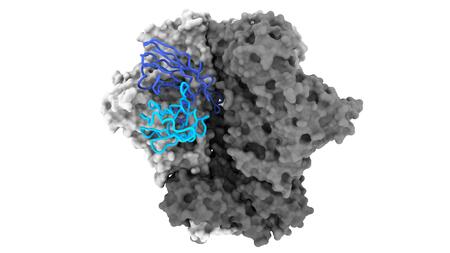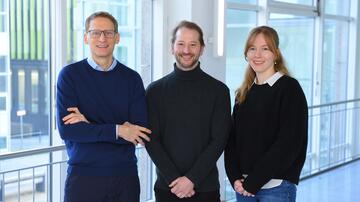Antibody discovered that blocks almost all known HIV variants in neutralization assays
Molecular binding of antibody 04_A06 to the HIV-1 surface protein (gray). Different domains of the antibody are represented by different shades of blue.
An international research team led by scientists from the DZIF at the University of Cologne has discovered an antibody that neutralizes the human immunodeficiency virus HIV-1 in almost all tested variants in vitro and even overcomes classic resistance mechanisms. This finding potentially opens up new perspectives for the prevention and treatment of HIV infections. The study was published today in Nature Immunology.
Among the antibodies discovered by the research team that are effective against HIV, the newly identified antibody with the number 04_A06 proved to be particularly effective in laboratory tests. It was able to neutralize 98.5 percent of more than 300 different HIV strains, making it one of the broadest-acting antibodies against HIV identified to date. In experiments with humanized mice—animals whose immune system has been modified to resemble that of humans—04_A06 permanently reduced the HIV viral load to undetectable levels. Most other HIV antibodies, in contrast, only achieve short-term effects in this animal model, as resistance develops quickly.
Antibodies are protein molecules of the immune system that specifically attack pathogens. Identifying an effective HIV antibody is a known challenge, given that the virus is constantly changing. As a result, many antibodies can only block certain variants of the virus. For the current study, the researchers examined blood samples from people referred to as ‘elite neutralizers’, whose immune system fights the virus with particular effectiveness. The researchers produced more than 800 antibodies from over 5,000 individual so-called B lymphocytes and tested their effectiveness. One stood out: antibody 04_A06 surpassed all others in terms of potency and breadth as determined by neutralization assays.
“With 04_A06, we have discovered an antibody that not only has an exceptionally broad activity, but also overcomes the virus’s classic resistance mechanisms. This could open up a promising approach for future clinical applications of antibodies against HIV,” says Dr Lutz Gieselmann, physician scientist at the Institute of Virology and first author of the study.
An important special feature of 04_A06 was revealed when analysing its structure. The antibody has an unusually long amino acid chain that reaches areas of the viral target that are often difficult to access. These areas are highly conserved and likely difficult for the virus to change without losing the ability to function. This may explain why 04_A06 maintains its antiviral properties against viral escape variants related to the viral CD4 binding site, which otherwise lead to a loss of function of other antibodies.
In addition to the laboratory tests, the researchers used computer models to assess the prevention efficacy of 04_A06. The models predicted that a single administration of 04_A06 could offer over 93 percent protection in clinical applications.
Altogether, the antiviral properties of 04_A06 suggest its use as a promising approach for both treating people living with HIV and preventing infection in those at increased risk. The antibody 04_A06 has been exclusively licensed to Vir Biotechnology, Inc.
Prof. Florian Klein, Director of the Institute of Virology at Cologne University Hospital, coordinator of the bridging topic “Antibody-Based Therapies” at the German Center for Infection Research (DZIF) and head of the study, emphasizes the international significance of the collaboration: “The success of this work relied on close collaboration with study centres in Africa, Nepal, and the USA. The next step is to further test the antibody’s safety and efficacy in clinical trials, thus paving its way to patient care.”
The study was supported by the Gates Foundation in furtherance of its charitable purposes, the German Research Foundation (DFG), the German Center for Infection Research (DZIF) and the European Research Council (ERC).
Source: Press release of the University Hospital Cologne (in German)




